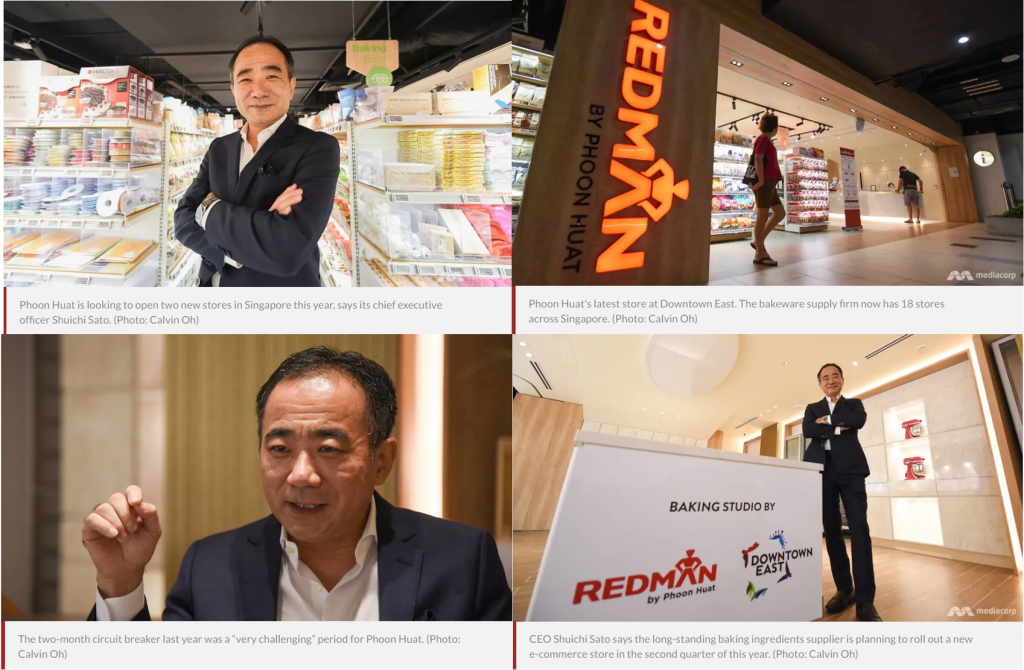
Channel News Asia | 22 Jan 2021 | Tang See Kit
SINGAPORE: Baking, according to the chief executive of baking ingredients supplier Phoon Huat, is an activity that brings “peace and happiness to the home”.
“The aroma of cakes is the best flavor to make everybody at home smile,” said Mr Shuichi Sato.
The 55-year-old is speaking very much from personal experience.
He bakes at least once a month and counts florentines with generous servings of hazelnut and walnut as his best item. While mostly self-taught, Mr Sato had opportunities to perfect his hobby by learning from professional bakers at his previous jobs – some of which were bakeries that he supplied ingredients to.
But more than satisfying taste buds, he finds baking an enjoyable family affair and one that never fails to bring back warm memories of time spent in the kitchen with his mother.
“I enjoy baking a lot,” he told CNA during an interview earlier this week.
And more people have been discovering the joy in mixing flour, butter, sugar and eggs, and turning them into decadent desserts with their home ovens in a year upended by a pandemic.
Last year, Phoon Huat saw demand from retail customers go through the roof, particularly during the “circuit breaker” period where people were cooped up at home.
“Out of the blue, many people started baking. Thanks to YouTube videos and easy-to-use pre-mixes, the barrier to entry is getting lower,” said Mr Sato, who took up the top job at the baking ingredients supplier in 2018.
Noticing the trend, Phoon Huat started offering online classes as an alternative after its baking studios were shut during the circuit breaker. These have received “decent positive responses”, and the company intends to keep at it to whet the appetite for recipes and baking advice among home bakers.
It is also looking at opening two new stores this year.
This will come on top of the four stores it opened last year, namely in Bukit Panjang, Jurong East, Yishun and Pasir Ris, which took its total number of stores to 18 across Singapore.
Demand from seasoned and new home bakers was a bright spot for Phoon Huat amid a pandemic-fuelled downturn, noted Mr Sato, and the company saw the need to expand its retail business in response to the shift.
The trend still has potential, he added. “Now that people have experienced how they can bake and produce a decent product, and the time for baking … brings about more family bonding, I think this will last.”
“BOTTLENECKS EVERYWHERE”
But 2020 was not all smooth sailing for the 74-year-old company. In particular, the two-month circuit breaker from April to June last year was “very challenging” as it raced to keep its retail stores operating under COVID-19 rules and grappled with a big hit on its business-to-business (B2B) segment.
On the retail front, it rolled out safe-distancing measures, stopped cross-deployment of employees across retail outlets and shortened opening hours in a bid to balance safety and manpower constraints.
It also implemented a system of odd or even-numbered days in which people were let into the store depending on the last digit of their identity card numbers, among others to manage queues.
But this did not stop long lines from forming in front of its stores. Customers also became frustrated when they could not get hold of baking staples such as flour and eggs.
Mr Sato acknowledged that some of these fast-selling items ran out at its stores for a few days, but stressed that it had stocks given its diversified supply chain spanning 900 suppliers worldwide.
The problem was in packing these ingredients that came in large quantities, such as flour in 25kg bags and cream cheese in nearly 20kg blocks, into smaller sizes for retail customers due to the smaller workforce allowed at its factory and warehouse.
Its suppliers overseas also had problems keeping up with demand.
“This home-baking trend is global, not just in Singapore, so even our supplier in Australia is being challenged because packing materials were not available,” he said.
“We want to open the store but from logistics, warehouse, production to retail, it was all under constraint,” Mr Sato recalled. “Bottlenecks everywhere.”
Meanwhile, construction work stopped at its new stores. This meant a pushback in rolling up the shutters, with the opening of the Bukit Panjang store delayed by almost three months.
Its B2B arm, which supplies to more than 4,000 hotels, restaurants and cafes in Singapore and forms the bulk of its business, took an even bigger hit.
“Three of our top 10 customers were almost closed during the circuit breaker, (which means) our sales became zero. The goods that we prepared were challenged and to shift that to retail is not that easy, because who will buy 20kg of cream cheese?”
Order cancellations flowed in and Phoon Huat had to write off some of the goods with a short shelf life. It also faced some “very limited” delays in payments.
“We accommodated all the cancellations and we also kind of close one eye (sic) for the payments,” Mr Sato said.
Since then, the situation among its business customers seems to have improved. While those in the hospitality sector remain nowhere near their heydays, bakeries and cafes that operate in residential areas “are now back to normal”, he added.
Asked how Phoon Huat fared in annual revenue last year, the chief executive officer said it remains comparable to the S$100-million milestone set in 2017.
“You may say, we managed to survive. The drop from B2B has been recovered by retail,” said Mr Sato.
FUTURE PLANS
Moving forward, Phoon Huat plans to roll out a new online shopping platform around June.
Its e-commerce site was launched last March after two years of preparation, but there can be room for improvements such as being more user-friendly.
So far, online sales “have been growing” but it is “not significant yet”, said Mr Sato.
Asked about the company’s pricing strategy, he noted that Phoon Huat will “always try to be the most affordable” in necessities such as flour, milk and sugar.
“We also have our customer relationship management scheme called the RedMan Rewards where people can gain points. I’m almost sure that for most of the items available at supermarkets, we are the lowest in price.”
It can do so given how it makes bulk purchases to ensure supplies to its B2B customers. The company also tries to stay lean and minimise waste in costs.
But its expansion in the retail space will surely add on to cost. To that, Mr Sato said: “We try to fill the space where we don’t have a presence… A lot of our customers write in to say ‘Please open a shop here’ and we listen and follow our customers, so we are quite confident.”
Affordable rent is also top on its mind. Amid the pandemic, landlords have been more open to negotiations over rent, he added.
“Our business model cannot afford to pay high rent. We are selling S$1.80 flour so how much can we make? Our margin is very, very slim therefore we try to find affordable rent places.”
The household brand in Singapore is hoping to venture abroad. It “almost concluded” an acquisition in a neighbouring market last January but that had to be put on hold due to the pandemic.
“We just resumed discussion with some companies for our growth in neighbouring countries,” Mr Sato told CNA. This will include expanding its B2B segment and setting up brick-and-mortar stores overseas.
Asked if that could happen this year, the chief executive officer replied: “We will try.”

